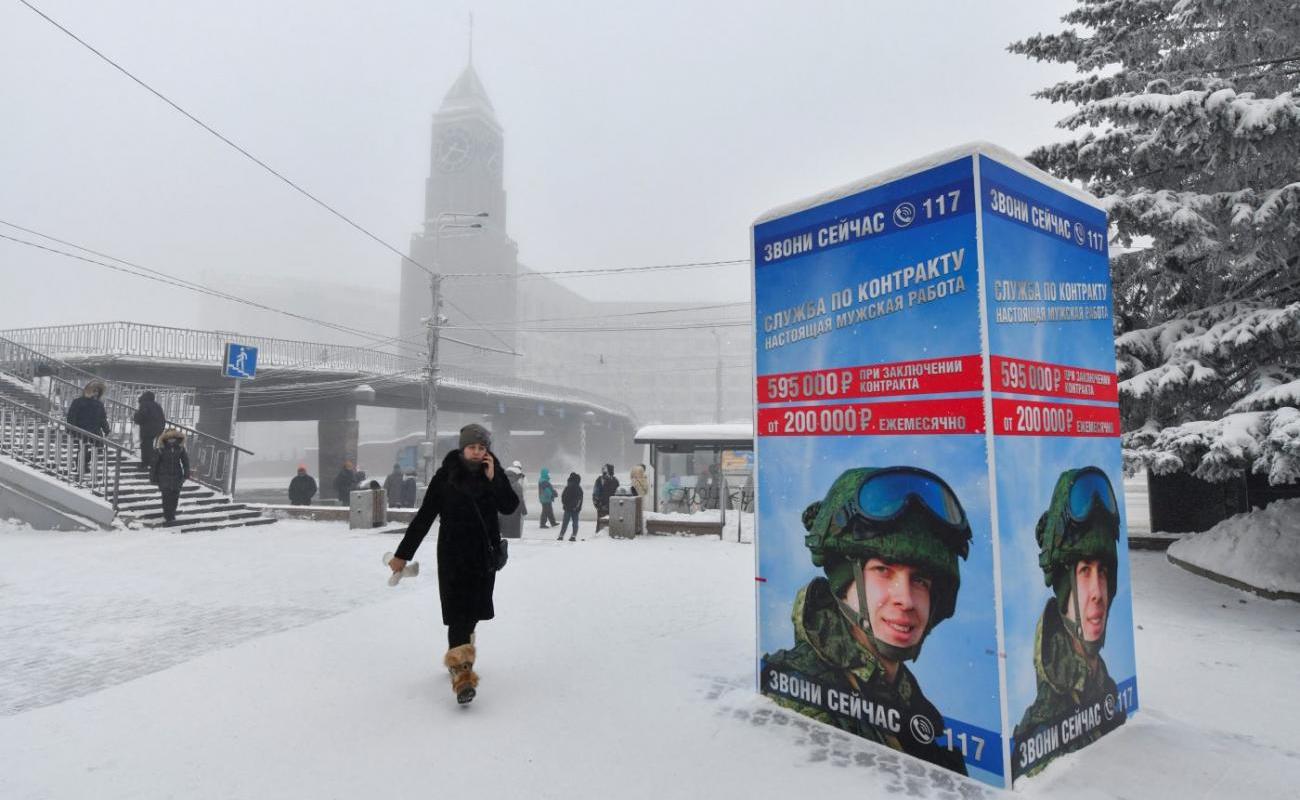Migrants Coerced into Fighting Putin’s War

A fresh wave of forced military registration has swept Russia, with migrants of military age detained and summonsed to feed the demand for frontline troops.
The Baza Telegram channel, which is suspected of links to the security services, reported at the beginning of December that more than 350 people had been detained and dispatched to the army after raids on warehouses and construction sites in the Moscow region.
Two days earlier, the St. Petersburg-based outlet Fontanka said 20 people had been forcibly registered with the military. All were migrants who had recently received Russian citizenship, it reported.
Ethnic minorities have borne the brunt of the Kremlin’s mobilization drive since the full-scale invasion of Ukraine. Wealthier Russians from western urban centers like Moscow are seemingly less heavily affected than migrant laborers with Russian citizenship, or ethnic groups from the Far Eastern regions.
The pattern was repeated when armed security personnel raided a shopping mall in the Urals city of Yekaterinburg, checking documents to identify people who had recently received Russian citizenship.
Ten taxi drivers with newly issued Russian papers were summoned to the military registration and enlistment office in the far east port of Vladivostok, according to the local branch of Russia’s Investigative Committee. In October, mosques and Muslim prayer houses were raided for the same purpose.
The full extent and scale of these raids is unclear. Men of military age have also been picked up individually at their universities and on the street outside Moscow metro stations.
“26-year-old Roman was detained by police at the Voikovskaya metro station exit,” Telegram channel Ostorozhno Moskva said on December 1. “After checking Roman’s documents, he was detained without explanation and taken to the Golovinsky military registration and enlistment office.”
The Kremlin is apparently ramping up the forced recruitment in a bid to avoid a fresh wave of “official” mobilization before the election season in March, heading off any challenge to President Vladimir Putin’s popularity before votes are cast.
In October, Alexander Bastrykin, head of the Investigative Committee, which is Russia’s federal investigation and law enforcement agency, said migrants should lose their citizenship if they refuse to participate in the war
Kommersant reported on December 15 that two immigrants had been deprived of their Russian citizenship for “evading” military duty, and about 15,000 migrants have been deported so far this year as part of a campaign against illegal migrants known as “Nelegal-2023.” Many raids were actively incited on social media, Bellingcat reported.
“In the first stage of Nelegal-2023 alone, Bellingcat found five instances where police raids immediately followed xenophobic channels posting the location of ‘migrants’,” the website said.
Russia’s Finnish frontier has also become a hotspot for forced recruitment. Finland closed its border for a second time in December in response to Russia granting visas and providing means of transport to vulnerable third-country nationals, including migrants and refugees from Somalia, Iraq, and other mainly Middle Eastern nations.
These people become extremely vulnerable the moment they overstay their visas. Russia has reportedly been coercing them to sign army contracts to serve in Ukraine to circumvent their deportation orders.
Exploiting third-country nationals in distress has become a central part of the recruitment process for the frontline – even places as distant as Nepal have struggled with Russian attempts to recruit nationals. Ten men were detained by police at the beginning of December for trafficking unemployed youths into the Russian army – and six Nepali citizens have been reported killed in Ukraine so far.
The callous practices involved in sourcing fresh cannon fodder show no signs of letting up.
Aliide Naylor is the author of‘ The Shadow in the East’ (Bloomsbury, 2020). She lived in Russia for several years and now reports from Ukraine and the Baltic states.
Europe’s Edge is CEPA’s online journal covering critical topics on the foreign policy docket across Europe and North America. All opinions are those of the author and do not necessarily represent the position or views of the institutions they represent or the Center for European Policy Analysis.
